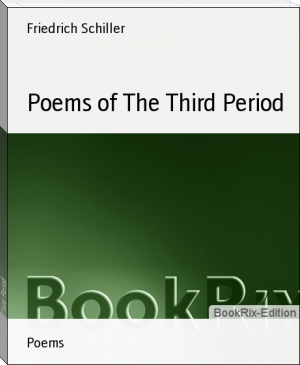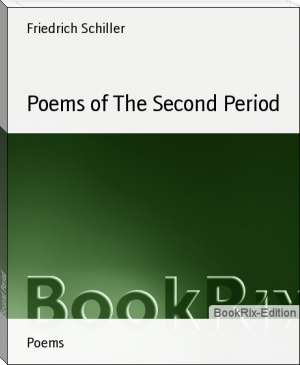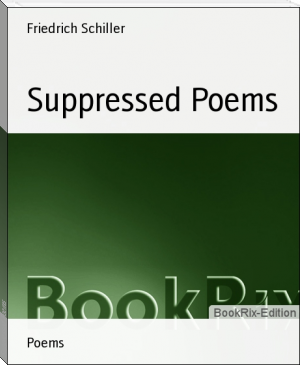Poems of The Third Period, Friedrich Schiller [best thriller novels to read .txt] 📗

- Author: Friedrich Schiller
Book online «Poems of The Third Period, Friedrich Schiller [best thriller novels to read .txt] 📗». Author Friedrich Schiller
answered, "Be it so!"
But o'er him came this thought,
When he was all-prepared to go,
"Will she command me aught?"
So to the Countess straight he went:
"I'm to the iron-foundry sent;
Then say, can I do aught for thee?
For thou 'tis who commandest me."
To this the Lady of Savern
Replied in gentle tone:
"To hear the holy mass I yearn,
For sick now lies my son;
So go, my child, and when thou'rt there,
Utter for me a humble prayer,
And of thy sins think ruefully,
That grace may also fall on me."
And in this welcome duty glad,
He quickly left the place;
But ere the village bounds he had
Attained with rapid pace,
The sound of bells struck on his ear,
From the high belfry ringing clear,
And every sinner, mercy-sent,
Inviting to the sacrament.
"Never from praising God refrain
Where'er by thee He's found!"
He spoke, and stepped into the fane,
But there he heard no sound;
For 'twas the harvest time, and now
Glowed in the fields the reaper's brow;
No choristers were gathered there,
The duties of the mass to share.
The matter paused he not to weigh,
But took the sexton's part;
"That thing," he said, "makes no delay
Which heavenward guides the heart."
Upon the priest, with helping hand,
He placed the stole and sacred band,
The vessels he prepared beside,
That for the mass were sanctified.
And when his duties here were o'er,
Holding the mass-book, he,
Ministering to the priest, before
The altar bowed his knee,
And knelt him left, and knelt him right,
While not a look escaped his sight,
And when the holy Sanctus came,
The bell thrice rang he at the name.
And when the priest, bowed humbly too,
In hand uplifted high,
Facing the altar, showed to view
The present Deity,
The sacristan proclaimed it well,
Sounding the clearly-tinkling bell,
While all knelt down, and beat the breast,
And with a cross the Host confessed.
The rites thus served he, leaving none,
With quick and ready wit;
Each thing that in God's house is done,
He also practised it.
Unweariedly he labored thus,
Till the Vobiscum Dominus,
When toward the people turned the priest,
Blessed them, - and so the service ceased.
Then he disposed each thing again,
In fair and due array;
First purified the holy fane,
And then he went his way,
And gladly, with a mind at rest,
On to the iron-foundry pressed,
Saying the while, complete to be,
Twelve paternosters silently.
And when he saw the furnace smoke,
And saw the workmen stand,
"Have ye, ye fellows," thus he spoke,
"Obeyed the Count's command?"
Grinning they ope the orifice,
And point into the fell abyss:
"He's cared for - all is at an end!
The Count his servants will commend."
The answer to his lord he brought,
Returning hastily,
Who, when his form his notice caught,
Could scarcely trust his eye:
"Unhappy one! whence comest thou?" -
"Back from the foundry" - "Strange, I vow!
Hast in thy journey, then, delayed?" -
"'Twas only, lord, till I had prayed."
"For when I from thy presence went
(Oh pardon me!) to-day,
As duty bid, my steps I bent
To her whom I obey.
She told me, lord, the mass to hear,
I gladly to her wish gave ear,
And told four rosaries at the shrine,
For her salvation and for thine."
In wonder deep the Count now fell,
And, shuddering, thus spake he:
"And, at the foundry, quickly tell,
What answer gave they thee?"
"Obscure the words they answered in, -
Showing the furnace with a grin:
'He's cared for - all is at an end!
The Count his servants will commend.'"
"And Robert?" interrupted he,
While deadly pale he stood, -
"Did he not, then, fall in with thee?
I sent him to the wood." -
"Lord, neither in the wood nor field
Was trace of Robert's foot revealed." -
"Then," cried the Count, with awe-struck mien,
"Great God in heaven his judge hath been!"
With kindness he before ne'er proved,
He led him by the hand
Up to the Countess, - deeply moved, -
Who naught could understand.
"This child, let him be dear to thee,
No angel is so pure as he!
Though we may have been counselled ill,
God and His hosts watch o'er him still."
THE GENIUS WITH THE INVERTED TORCH.
Lovely he looks, 'tis true, with the light of his torch now extinguished; But remember that death is not aesthetic, my friends!
THE COUNT OF HAPSBURG. [38]
A BALLAD.
At Aix-la-Chapelle, in imperial array,
In its halls renowned in old story,
At the coronation banquet so gay
King Rudolf was sitting in glory.
The meats were served up by the Palsgrave of Rhine,
The Bohemian poured out the bright sparkling wine,
And all the Electors, the seven,
Stood waiting around the world-governing one,
As the chorus of stars encircle the sun,
That honor might duly be given.
And the people the lofty balcony round
In a throng exulting were filling;
While loudly were blending the trumpets' glad sound,
The multitude's voices so thrilling;
For the monarchless period, with horror rife,
Has ended now, after long baneful strife,
And the earth had a lord to possess her.
No longer ruled blindly the iron-bound spear,
And the weak and the peaceful no longer need fear
Being crushed by the cruel oppressor.
And the emperor speaks with a smile in his eye,
While the golden goblet he seizes:
"With this banquet in glory none other can vie,
And my regal heart well it pleases;
Yet the minstrel, the bringer of joy, is not here,
Whose melodious strains to my heart are so dear,
And whose words heavenly wisdom inspire;
Since the days of my youth it hath been my delight,
And that which I ever have loved as a knight,
As a monarch I also require."
And behold! 'mongst the princes who stand round the throne
Steps the bard, in his robe long and streaming,
While, bleached by the years that have over him flown,
His silver locks brightly are gleaming;
"Sweet harmony sleeps in the golden strings,
The minstrel of true love reward ever sings,
And adores what to virtue has tended -
What the bosom may wish, what the senses hold dear;
But say, what is worthy the emperor's ear
At this, of all feasts the most splendid?"
"No restraint would I place on the minstrel's own choice,"
Speaks the monarch, a smile on each feature;
"He obeys the swift hour's imperious voice,
Of a far greater lord is the creature.
For, as through the air the storm-wind on-speeds, -
One knows not from whence its wild roaring proceeds -
As the spring from hid sources up-leaping,
So the lay of the bard from the inner heart breaks
While the might of sensations unknown it awakes,
That within us were wondrously sleeping."
Then the bard swept the cords with a finger of might,
Evoking their magical sighing:
"To the chase once rode forth a valorous knight,
In pursuit of the antelope flying.
His hunting-spear bearing, there came in his train
His squire; and when o'er a wide-spreading plain
On his stately steed he was riding,
He heard in the distance a bell tinkling clear,
And a priest, with the Host, he saw soon drawing near,
While before him the sexton was striding."
"And low to the earth the Count then inclined,
Bared his head in humble submission,
To honor, with trusting and Christian-like mind,
What had saved the whole world from perdition.
But a brook o'er the plain was pursuing its course,
That swelled by the mountain stream's headlong force,
Barred the wanderer's steps with its current;
So the priest on one side the blest sacrament put,
And his sandal with nimbleness drew from his foot,
That he safely might pass through the torrent."
But o'er him came this thought,
When he was all-prepared to go,
"Will she command me aught?"
So to the Countess straight he went:
"I'm to the iron-foundry sent;
Then say, can I do aught for thee?
For thou 'tis who commandest me."
To this the Lady of Savern
Replied in gentle tone:
"To hear the holy mass I yearn,
For sick now lies my son;
So go, my child, and when thou'rt there,
Utter for me a humble prayer,
And of thy sins think ruefully,
That grace may also fall on me."
And in this welcome duty glad,
He quickly left the place;
But ere the village bounds he had
Attained with rapid pace,
The sound of bells struck on his ear,
From the high belfry ringing clear,
And every sinner, mercy-sent,
Inviting to the sacrament.
"Never from praising God refrain
Where'er by thee He's found!"
He spoke, and stepped into the fane,
But there he heard no sound;
For 'twas the harvest time, and now
Glowed in the fields the reaper's brow;
No choristers were gathered there,
The duties of the mass to share.
The matter paused he not to weigh,
But took the sexton's part;
"That thing," he said, "makes no delay
Which heavenward guides the heart."
Upon the priest, with helping hand,
He placed the stole and sacred band,
The vessels he prepared beside,
That for the mass were sanctified.
And when his duties here were o'er,
Holding the mass-book, he,
Ministering to the priest, before
The altar bowed his knee,
And knelt him left, and knelt him right,
While not a look escaped his sight,
And when the holy Sanctus came,
The bell thrice rang he at the name.
And when the priest, bowed humbly too,
In hand uplifted high,
Facing the altar, showed to view
The present Deity,
The sacristan proclaimed it well,
Sounding the clearly-tinkling bell,
While all knelt down, and beat the breast,
And with a cross the Host confessed.
The rites thus served he, leaving none,
With quick and ready wit;
Each thing that in God's house is done,
He also practised it.
Unweariedly he labored thus,
Till the Vobiscum Dominus,
When toward the people turned the priest,
Blessed them, - and so the service ceased.
Then he disposed each thing again,
In fair and due array;
First purified the holy fane,
And then he went his way,
And gladly, with a mind at rest,
On to the iron-foundry pressed,
Saying the while, complete to be,
Twelve paternosters silently.
And when he saw the furnace smoke,
And saw the workmen stand,
"Have ye, ye fellows," thus he spoke,
"Obeyed the Count's command?"
Grinning they ope the orifice,
And point into the fell abyss:
"He's cared for - all is at an end!
The Count his servants will commend."
The answer to his lord he brought,
Returning hastily,
Who, when his form his notice caught,
Could scarcely trust his eye:
"Unhappy one! whence comest thou?" -
"Back from the foundry" - "Strange, I vow!
Hast in thy journey, then, delayed?" -
"'Twas only, lord, till I had prayed."
"For when I from thy presence went
(Oh pardon me!) to-day,
As duty bid, my steps I bent
To her whom I obey.
She told me, lord, the mass to hear,
I gladly to her wish gave ear,
And told four rosaries at the shrine,
For her salvation and for thine."
In wonder deep the Count now fell,
And, shuddering, thus spake he:
"And, at the foundry, quickly tell,
What answer gave they thee?"
"Obscure the words they answered in, -
Showing the furnace with a grin:
'He's cared for - all is at an end!
The Count his servants will commend.'"
"And Robert?" interrupted he,
While deadly pale he stood, -
"Did he not, then, fall in with thee?
I sent him to the wood." -
"Lord, neither in the wood nor field
Was trace of Robert's foot revealed." -
"Then," cried the Count, with awe-struck mien,
"Great God in heaven his judge hath been!"
With kindness he before ne'er proved,
He led him by the hand
Up to the Countess, - deeply moved, -
Who naught could understand.
"This child, let him be dear to thee,
No angel is so pure as he!
Though we may have been counselled ill,
God and His hosts watch o'er him still."
THE GENIUS WITH THE INVERTED TORCH.
Lovely he looks, 'tis true, with the light of his torch now extinguished; But remember that death is not aesthetic, my friends!
THE COUNT OF HAPSBURG. [38]
A BALLAD.
At Aix-la-Chapelle, in imperial array,
In its halls renowned in old story,
At the coronation banquet so gay
King Rudolf was sitting in glory.
The meats were served up by the Palsgrave of Rhine,
The Bohemian poured out the bright sparkling wine,
And all the Electors, the seven,
Stood waiting around the world-governing one,
As the chorus of stars encircle the sun,
That honor might duly be given.
And the people the lofty balcony round
In a throng exulting were filling;
While loudly were blending the trumpets' glad sound,
The multitude's voices so thrilling;
For the monarchless period, with horror rife,
Has ended now, after long baneful strife,
And the earth had a lord to possess her.
No longer ruled blindly the iron-bound spear,
And the weak and the peaceful no longer need fear
Being crushed by the cruel oppressor.
And the emperor speaks with a smile in his eye,
While the golden goblet he seizes:
"With this banquet in glory none other can vie,
And my regal heart well it pleases;
Yet the minstrel, the bringer of joy, is not here,
Whose melodious strains to my heart are so dear,
And whose words heavenly wisdom inspire;
Since the days of my youth it hath been my delight,
And that which I ever have loved as a knight,
As a monarch I also require."
And behold! 'mongst the princes who stand round the throne
Steps the bard, in his robe long and streaming,
While, bleached by the years that have over him flown,
His silver locks brightly are gleaming;
"Sweet harmony sleeps in the golden strings,
The minstrel of true love reward ever sings,
And adores what to virtue has tended -
What the bosom may wish, what the senses hold dear;
But say, what is worthy the emperor's ear
At this, of all feasts the most splendid?"
"No restraint would I place on the minstrel's own choice,"
Speaks the monarch, a smile on each feature;
"He obeys the swift hour's imperious voice,
Of a far greater lord is the creature.
For, as through the air the storm-wind on-speeds, -
One knows not from whence its wild roaring proceeds -
As the spring from hid sources up-leaping,
So the lay of the bard from the inner heart breaks
While the might of sensations unknown it awakes,
That within us were wondrously sleeping."
Then the bard swept the cords with a finger of might,
Evoking their magical sighing:
"To the chase once rode forth a valorous knight,
In pursuit of the antelope flying.
His hunting-spear bearing, there came in his train
His squire; and when o'er a wide-spreading plain
On his stately steed he was riding,
He heard in the distance a bell tinkling clear,
And a priest, with the Host, he saw soon drawing near,
While before him the sexton was striding."
"And low to the earth the Count then inclined,
Bared his head in humble submission,
To honor, with trusting and Christian-like mind,
What had saved the whole world from perdition.
But a brook o'er the plain was pursuing its course,
That swelled by the mountain stream's headlong force,
Barred the wanderer's steps with its current;
So the priest on one side the blest sacrament put,
And his sandal with nimbleness drew from his foot,
That he safely might pass through the torrent."
Free e-book «Poems of The Third Period, Friedrich Schiller [best thriller novels to read .txt] 📗» - read online now
Similar e-books:





Comments (0)